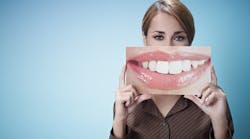Lifting the veil on "creepy smiles"
"Their smiles are all the same, their smiles are impeccable, their smiles are an advertisement for smiling itself": A dentist with a large TikTok following has made it her mission to “lift the veil” on what she perceives as problematic uniformity of people’s teeth and smiles, due largely to the growing popularity of veneers she says are unnecessary or even damaging. “It’s not even trying to mimic nature,” said Sara Hahn, DMD, in The Washington Post. “It’s just trying to look like, ‘I have big, white, perfect, straight teeth.’”
Association between OH, head and neck cancers
Healio reports on an association between poor oral health and an increase in head and neck cancers, specifically noting that patients who more frequently visited the dentist may be more likely to have their cancer diagnosed at an early stage, increasing their chances of survival. The research included some 2,500 people with head and neck squamous cell carcinoma who participated in four studies—the largest patient cohort for such a study— with results suggesting that good oral hygiene as well as frequent dental visits can help increase overall survival (OS) rates among patients with that type of cancer.
New at-home test for gingivitis
Engineers at the at the University of Cincinnati have developed a new at-home device that could mitigate early risks of tooth decay by detecting the specific bacteria that cause gingivitis. By pretreating saliva samples with potato starch to remove a protein that could interfere with test results, developers engineered the test to be able to detect the P. gingivalis endotoxin, a major saliva biomarker for oral health.
ICYMI: Majority of women not aware of menopause, OH connection
Findings of a recent study of women 50 and older show that 84% are not aware of the potential impact of menopause on their oral health, even as 79% say they’ve noticed a change in their teeth and gums as they age. Among the results of Delta Dental’s study called “Breaking the stigma: Let’s talk about menopause and oral health,” 70% of respondents who’ve started experiencing menopausal symptoms have noticed certain oral health symptoms, such as dry mouth, but didn’t associate the symptoms with hormonal changes.





